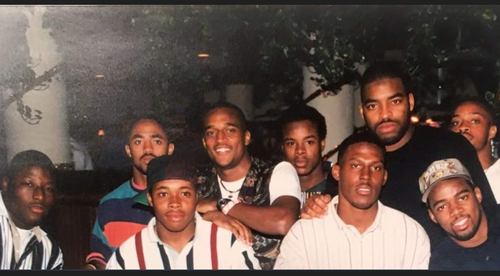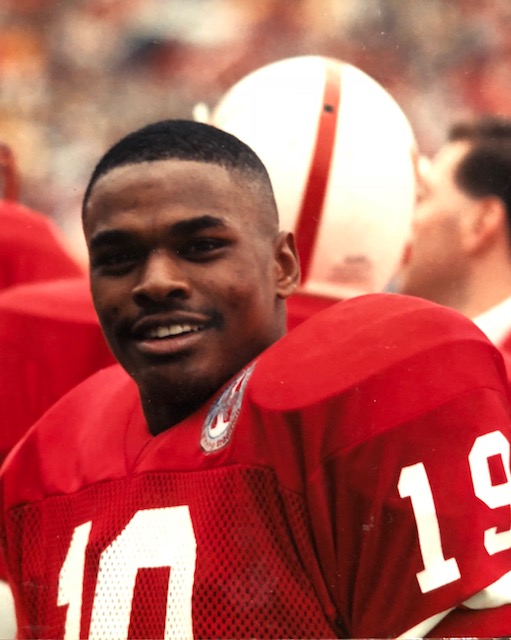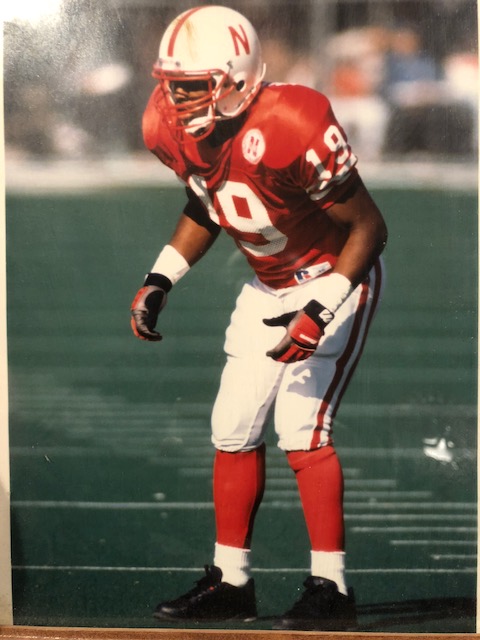Anatomy of an Era: Lorenzo Brinkley & Kenny Wilhite, Part 3

Excerpted from Chapter 11, No Place Like Nebraska: Anatomy of an Era, Vol. 1 by Paul Koch
Lorenzo Brinkley & Kenny Wilhite, Part 3
Scholarship recruit, Cornerback, St. Louis, Missouri (Hazelwood Central)
& Scholarship recruit, Cornerback, St. Louis, Missouri (Oakville)
LB: It’s about the players. Once it stops being about the players then you have to get out of the game. Coach Osborne made it about us; it wasn’t about his wins and losses, it was about his players and how he cared about them as people. Tony is the same way, and I am the same way myself. Growing up in the neighborhood I grew up in, I always said if I ever find a way of helping the youth of today I’m gonna do it. That’s what I’m trying to do. Once I lose the love of teaching and helping them to become men -not only football players, but young men- then I’ve gotta get out of it.
Coach Samuel solidified to me (ever since my first coaching job), that there was a place for my personality. I’m a lot calmer in situations, something I learned when I was a kid. One guy was my baseball coach, a very good coach, and he always talked about being able to perform in crunch time and not getting rattled, about taking yourself to another place, so I learned that from him a long time ago. I never felt like I would lose. Even now, we’re going into all the games thinking we’ve always got a chance. I mean, what are you even doing out there if you don’t think you’ve got a chance?
Q: What led to that belief?
LB: On those teams at Nebraska I just think that we befriended each other, we genuinely cared for each other, and we competed with each other every day. And you understood that if you didn’t compete someone was gonna take your spot away.
Q: Were there any cliques? Walk-ons vs. scholarship guys? Black vs. white? Anything like that?
LB: That was something that Coach Osborne can hang his hat on, because he never treated anybody any different than the rest. I never saw anybody else treat anybody differently. I don’t think any of the coaches shunned you. If you asked ’em something you’d get a straight answer.
Q: Coach Osborne had a good, sarcastic sense of humor too, didn’t he?
LB: Yeah, he did. (laughs) He did. And the great thing about it was that you never saw it coming, either.
And I have to mention, I liked the fact that sometimes former players would come back. One of the guys that helped me out tremendously was Brian Washington. The thing about him was that I played ball against him in the rec center and things like that, Lorenzo Hicks was around some times, Morgan Gregory was still around for some basketball games, Tyrone Legette.
And if you remember, Brian Washington was drafted by the Browns and then got picked up by the Jets later. And I don’t know if he made it to a Pro Bowl or not, but he was really productive, and during those years I would see him working out. He would go out and have a great time at night and then the next morning would be up before anybody and he would bust his tail. And I thought, ‘Man, if he can sit out a year from the NFL and then come back and be productive, then I need to be working out with this guy.’
Q: A good role model for you?
LB: Yeah, in that aspect. (laughs) He was a hell of an athlete. Those were some great basketball games we used to play.
Q: What about changes, things you’d implement today if you were starting from scratch in building a championship team?
LB: Just making everybody accountable and then making everybody feel like they are responsible, that was something new and really important, too. The whole team has to be accountable as individuals, but they also have to feel ownership together, too. To put it in a nutshell -you know how it is- if you feel you have a bunch of talent but your whole thought process was about pro football, you won’t make much happen.
I think that as some of that mindset started to graduate and leave we just started getting a different attitude. We decided, “Hey, it’s time to stop doing this and doing that, it’s time to make things happen and become accountable to each other.” If not, you’ll come up short. And the worst thing in the world was getting your asses kicked in front of the world in January. (laughs)
Q: Sure, everyone is watching: your old neighborhood buddies, people who said you wouldn’t make it, family, old girlfriends, you name it?
LB: Exactly, you want to prove to everyone that we had what it took. All the shit we used to hear about losing to the Florida teams? We had to prove everyone wrong.

Kenny Wilhite #19 (Unknown Source)
Q: Tell me more about Charlie McBride…
KW: Very, very intense. Yeah, we talk about him all the time. Something we remember the most when we all talk about him are his pregame speeches. Oh yeah, he was the guy, you know? He walks around practice and he’s yelling and screaming and he’s got chew all down his shirt. But his pregame speeches? Oh my goodness, by the time he’d gotten done with his pregame speech we ran down that back stairway to get on that field! How intense his speeches were!
Q: Any particular speech come to mind? What did he say or how did he go about it? What was the method to his madness?
KW: He wanted tough football players, he wanted guys who would lay it on the line. It was love. That whole staff, I can say they genuinely loved every player. He told us he loved us, he knew we were gonna play well, and his last words would be, “Now go out there and kick their f#%n’ you know what!” And we’d be jumping up and down and we’d run down that back hallway, that back stairway, and we wanted to go play, man.
And you know, you can have good football players who are nice, you know what I mean? I don’t like to use the words ‘mean and nasty’ too often, but those earlier teams I don’t think we had enough nasty guys. The younger guys that were coming up were more nasty than the guys that were a little older.
Q: Was that something that was taught or did it come natural to them, Kenny?
KW: You are born with it. You can try to teach kids to be nasty, be physical, be tough, but I think you’re born with it. And teams can bring it out in you.
Like I said, from the age of 5 I wanted to play in the NFL and I was tough and brave and would not back down from anything, from no challenge whatsoever.
Q: It probably didn’t help being a little guy, right? I’m exactly your size, so I know what you’re talking about.
KW: You know, a lot of guys think ’cause your small they can dominate you’ or they can beat you at this. I was always the one to make believers out of everybody.
Q: Do you guys keep in touch with many other old teammates?
LB: I used to be around Lawrence Phillips when he was in St. Louis with the Rams. I was around him and Toby (Wright) a little bit.
Q: Do you ever keep in touch with L.P.?
LB: It’s a little hard now, the last time I talked to him was ’99 or so. At times he could be impulsive, but honestly he wasn’t like a guy who would beat people up. He was the most talented guy. I remember his freshman year, there were two situations: one time in practice I was coming up on an angle to wrap him up… and he changed a gear and (you know how some guys on the sidelines can make some catcalls like, “Woooo!”? I turned around and said, “Man, he’s gonna be something special!”) ..he made a move on me, he was special!
And then another time against UCLA when he came in and helped us with that game. It was a close one.
Q: How often would you guys keep in touch in St. Louis?
LB: We were closer. I had a job, so sometimes I’d just hang out with the guy. Lawrence was just a young kid from L.A. with a whole damn lot of money! You know? He just needed an older person to be with him, kind of point out things -I wouldn’t say to guide him, as most young men aren’t liking to be led anymore- but just to point stuff out to him. He probably needed someone like that he could trust, and maybe he would have had a different outcome. Everybody’s trying to get you to sign up for this and show up for that, whatever. Help someone start up something, all kind of stuff.
Q: Everyone wanted a piece of him?
LB: Yeah, all kind of stuff. He was a good dude. If you talk to him tell him he’s always got a friend in me.
KW: Oh, and before you go, do you remember how Coach Osborne didn’t like quarterbacks to turn down contact? It goes without saying that that had an effect on the team, too. He told his quarterbacks they could not run out of bounds, he told you what he wanted and what he expected.
Q: Matt Turman said the same thing. Well, before we go is there a game that stands out as the shining point of your career as Nebraska Blackshirts?
KW: I wouldn’t say a game, in particular. (Though the craziest was Colorado in ’91 and we tied them. It was cold and they were throwing snowballs at us. That was the craziest.) I would say walking across that stage midway through my senior year in December for that diploma. Because football, yeah, you know you have your moments and you have your highlights, but the thing I remember the most, the biggest moment that I will always cherish is walking across that stage with my diploma. After being told I wasn’t gonna graduate: I was never the smartest, I wasn’t big enough, I wasn’t this, I wasn’t that, the biggest moment was walking across that stage and getting that diploma in December of ’92.

Kenny Wilhite #19 (Unknown/Uncredited)
End conversation.
Well, I guess we all know who I have to get in contact with after this conversation: Toby Wright. I find it peculiar how a small contingent were able to inspire such a number of their peers. I want to contact those guys -Kevin Raemakers, Trev Alberts, John Parrella & Toby Wright- to get an idea of what made them tick, what ingredients of their personalities and their attitudes made them lightning rods for future Husker success.
Don’t ask me why, but I don’t suppose the average fan comprehends the mental acuity, communication and interpersonal skills needed to play great defensive football. When a coaching staff prepares the unit to operate at ultra-proficient degrees the game seems to flow that much easier, enabling them to throw a massive wrench in the opposing team’s engineworks. That being said, it’s taken up a notch even further when it caters to the mindset, the innate sensibilities of those playing their positions. The switch to the 4-3 defense coupled with the arrival of Toby Wright seems to have struck a chord in the defensive backfields of those days, because instead of reading and reacting to what the offense was showing they instead became proactive to an extravagant degree and unleashed the inner Blackshirt. As Lorenzo said, “I think it became more fun, because we were flying around.” That must have been pure bliss to operate on the edge of abandon and yet maintain solidarity in quashing opponent’s offensive dreams.
Both Kenny and Lorenzo touched on the fact that many of the players began to forgo their future professional aspirations and instead live ‘in the moment,’ focusing on attainment of the Nebraska’s team goals instead of self-preservation at the expense of unity. Trust me, those kids knew if someone was dogging it or ‘pussy-footing’ around and not giving their full effort. If so, they either came around quickly or were, as was stated earlier, ‘forced’ off the team. With this ‘high tides lift all boats’ mentality the change in the general player mindset of the day contributed greatly to their success.
Then Lorenzo added, “the worst thing in the world was getting your asses kicked in front of the world in January.” Remember that? Kenny also touched on ‘negative motivation’ with his, “There were a lot of guys in the neighborhood said I wasn’t gonna make it, said I was too small. So that was my ultimate driving point.” To add, I was the strength coach for the Nebraska Basketball team for a number of years and one of the more memorable pregame speeches given by Head Coach Danny Nee in that era started with: “Boys, one of the greatest feelings in life is proving people wrong.” (The Huskers knocked off #1 Kansas that night despite the Vegas bookies saying it couldn’t be done.) Returning to the old neighborhood to confront the naysayers and the Negative Nelly’s played a part in many sub-plots, acting as a source of inspiration instead of throwing in the towel when the going seemed too tough to bear. So it appears there was (and is) a place for negative motivation. Kenny also had the negative motivation of losing a starting job caused by competition with the up and comers, “And like I said, Barron Miles was behind me, and I didn’t want to lose my job as a senior to the guy.” Whether you look at it as a boon or a thorn, negative motivation played its part, and the ‘here & now’ attitude combined with a team-wide aversion of future embarrassments on national television played a decisive role in the buildup to those 60 & 3 years.
Notable quotes #3:
Lorenzo Brinkley on team motivation: “…the worst thing in the world was getting your asses kicked in front of the world in January.”
Notable quote #4:
Kenny Wilhite on his greatest achievement: “The biggest moment that I will always cherish is walking across that stage with my diploma. After being told I wasn’t gonna graduate: I was never the smartest, I wasn’t big enough, I wasn’t this, I wasn’t that.”
Copyright @ 2013 Thermopylae Press. All Rights Reserved.
Photo Credits : Unknown Original Sources/Updates Welcomed
Paul Koch